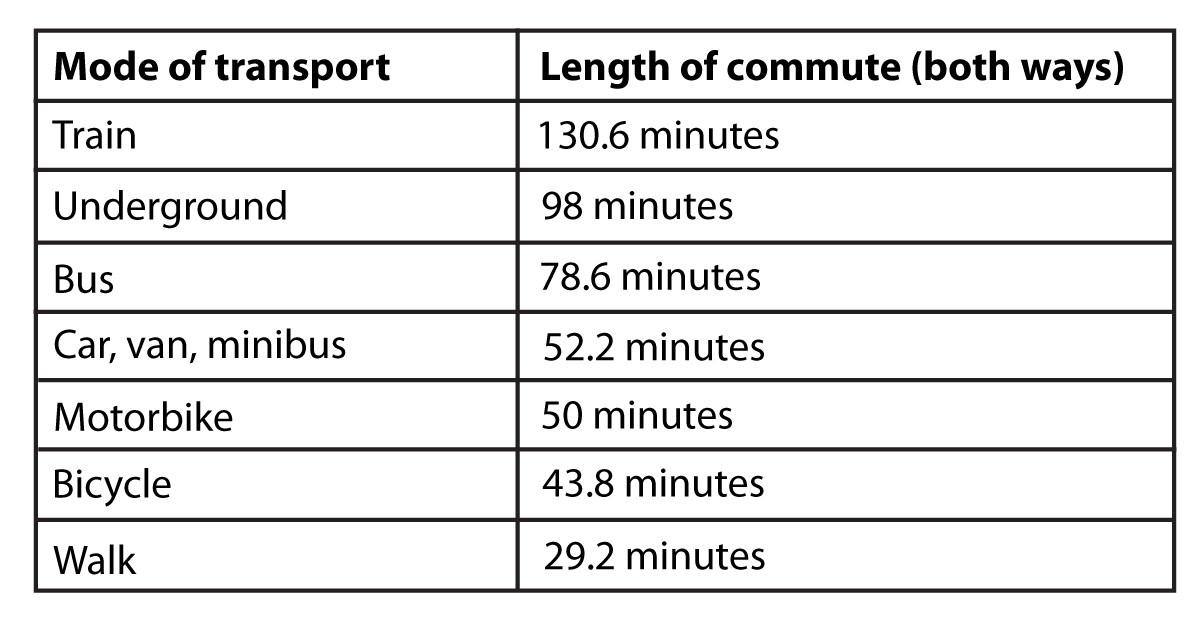Commuting: how to make the most of what you've got

27/06/2023
Commuting: how to make the most of what you've got
Travelling to and from work is no-one’s idea of fun. Whether you’re sat cursing in traffic or wading through fellow commuters at the train station it eats into your all-important ‘me’ time.
The reality though, is we’re spending more time getting to our jobs than ever.
A look at the numbers…
According to research, the average UK employee spends almost one hour (58.4 minutes, to be precise) commuting to and from work; that’s a five-minute increase from the decade before and totals a soul-crushing 219 hours a year.
Mode matters
If your heart just sank reading those numbers there could be a quicker way - albeit depending on your distance and location.
The same study also uncovered the time differences between the type of transport:
Londoners get the short straw
Unsurprisingly, workers in the capital spend more of their day commuting than any other region. From best to worst, here’s the geographic breakdown:
- Northern Ireland - 46 minutes
- North East - 52 minutes
- South West 51.6 minutes
- Scotland - 52.2 minutes
- West Midlands - 52.4 minutes
- Yorkshire and Humberside - 52.6 minutes
- North West - 53 minutes
- East Midlands - 53 minutes
- Wales - 53.2 minutes
- South East - 62 minutes
- East of England - 62 minutes
- London - 80.8 minutes
The knock-on effect
Long commutes cost employers and employees dearly - financially, emotionally, and physically.
Reduced productivity: it’s estimated lengthy travel times cost businesses the equivalent of around 20 million working days each year. On an individual level, that equates to around 2.3 days’ less productive time.
Lack of balance: the longer your commute, the earlier you have to get up, the later you get home, and the less time you have to take care of yourself. The net effect? Tired teams who potentially resent how much of their day’s spent on the road.
Insufficient sleep: employees who commute more than one hour each way are said to be 22% more likely to get less than the recommended seven hours sleep a night, which, over time, could interfere with their physical and mental wellbeing.
Retention: people know what their commute will be before they even send their CV in, but what they might not realise is how much it’ll wear them down. They might not think it’s a problem at first but as the weeks, months and years pass by it can soon take its toll.
The result? They end up leaving to find a job closer to home; regardless of how happy they otherwise were with you.
What you can do
Whether you’re an employer or employee reading this, there are things you can do to make the most of a less-than-ideal situation.
Employees
- To help your commute feel less like dead time make the most of every minute by doing something that’ll enrich your journey. If you’re into podcasts, stick one on. If you enjoy reading, pack a book. If you’ve got life admin to sort, take it with you. If you’re learning a language, practise some more. The list goes on and on, but find something that works for you and engrain it into your routine.
- Experiment with different modes of transport. We touched on it in the table earlier on, but whether you’re driving, walking, cycling or public transporting can make a difference. So, see what’s feasible in relation to the length of your commute and do a bit of trial and error; you might even find you can kill two birds with one stone and squeeze some exercise into your travel time - win, win.
- Sticking with the trial and error theme, play around with what time you leave at too - it’s amazing how much of a difference setting of 10 minutes earlier or later can make sometimes.
Employers
In almost every survey you stumble across flexible working comes out as the number one perk people want. Ping pong tables and free booze are nice and all that, but they don’t support the practicalities of everyday life.
Admittedly, contact centres have it a bit tougher when it comes to accommodating this, but that definitely doesn’t mean it’s impossible; especially if it’s the difference between keeping or losing great agents because of their commute.
Flexible working - the benefits:
- More productive teams;
- Lower overheads;
- Higher business turnover;
- Greater employee appreciation, engagement and satisfaction; and
- Reduced employee turnover.
Understandably, there’s a lot of uncertainty when it comes to implementing flexible and/or home working. How do you know if people are still working? Will your customers suffer from a worse experience? Will people start to take the mick?
But here’s how to iron it out:
- Recruit the right people. You need people you can trust, are comfortable working on their own, and have the experience needed to get on with the job unattended.
- Keep them motivated. Out of sight doesn’t mean out of mind. Remember to regularly touch base with home workers, keep them up-to-date with what’s going on in the office, and still involve them in decisions.
- Make sure they’ve got what they need. Provide them with all the relevant equipment (headsets, computers, phones, and cables, etc.) and check their home office is conducive for the job and their wellbeing.
- Communicate clearly. Put extra thought and attention into shift planning and communicate it in advance so everyone’s on the same page.
Make sure you’re explicit with objectives and targets too - to save any confusion it might be worth bringing everyone into the office, say, once a month, to go through the commercial stuff face-to-face. - Keep on top of their activity. Make a point of checking in to your software every now and then to ensure everyone’s pulling their weight. Usually, employees appreciate the luxury of working from home so much they naturally end up putting in that 10% more, but if they’re not, don’t be afraid to bring it up.
Whether you’re an employee looking to relocate or an employer looking to recruit, we’ve got the tools and expertise to help find what you need. Get in touch with the team on 01905 330 790 or info@cactussearch.co.uk to see what we can do for you.
